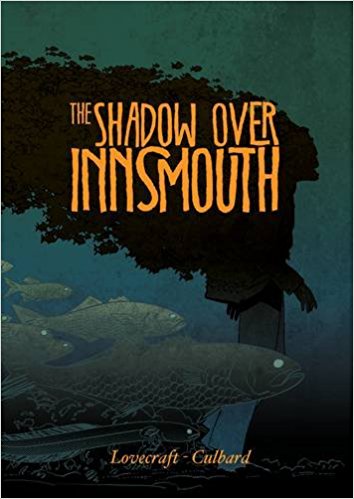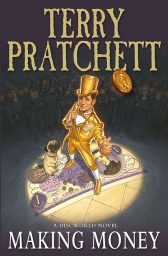The Double-Edged Sword of Dogmatism
Saturday , 13, May 2017 Appendix N, Authors, Before the Big Three, Fiction, Uncategorized 12 Comments Last week, I wrote an observation about Lovecraft’s works. In the comments, several readers mentioned The Shadow over Innsmouth, a tale I had embarrassingly not read at the time. I rectified this error soon after. And wow, what an amazing story! An imaginative gem from beginning to end, with steadily mounting tension, an inspired explanation to the madness, several outstanding, unforgettable visual images, and a surprising, creepy ending.
Last week, I wrote an observation about Lovecraft’s works. In the comments, several readers mentioned The Shadow over Innsmouth, a tale I had embarrassingly not read at the time. I rectified this error soon after. And wow, what an amazing story! An imaginative gem from beginning to end, with steadily mounting tension, an inspired explanation to the madness, several outstanding, unforgettable visual images, and a surprising, creepy ending.
As any reader of Lovecraft is aware of, bloodline degradation is a common theme of his. A once proud race or peoples is sullied, either through natural degradation or ill-advised unions. To use the examples in last week’s article, there is a natural decline with the central family in The Shunned House or the town in The Dunwich Horror. The dangers of race-mixing are subtly suggested by the villainous half-caste smugglers in The Case of Charles Dexter Ward and the crazed half-caste cultists in The Call of Cthulhu.
However, in all those stories, it remains a minor, background element. By contrast, in The Shadow over Innsmouth, it is the dominant idea of the work. A town is ruined and suffers a horrifying fate by destroying their bloodline through a perverse coupling. While this takes on a demonic, supernatural manifestation there, it likely reflected Lovecraft’s general views on race mixing.
Regardless of whether one fully agrees with the author or his fixation on the matter, one conclusion is unavoidable. It lends a unique flavor to his stories. And in the case of The Shadow over Innsmouth, results in a wonderful classic.
One doesn’t have to subscribe to an author’s idea to appreciate the zest it adds to their writing. For instance, I like novels with a distinct Christian morality. (Castalia House author John C Wright comes to mind, among others) This, despite not being Christian or even religious myself.
So in this case, Lovecraft’s strong personal views about pedigree, to the point of dogma, are a positive element adding to his writing. But is this true in general?
Of course not! One can think of many authors who push a tiresome political perspective, particularly of the leftist variety, where their dogmatism severely hurts their writings. Which brings us to another question; when is this a boon versus a liability?
It would be easy to claim talent or competence is the delineating factor. Lovecraft was a great writer, so for him, it makes his short stories even better. John Scalzi is a one-dimensional hack, so parroting SJW claptrap with “strong female protagonists” makes his novels even worse. Incorporating personal views simply accentuates a writer’s intrinsic strength or weakness.
However, this would not be a fair or correct assessment. While no great fan of hers, it’s undeniable that Ursula Le Guin had a certain degree of talent. (Read The Lathe of Heaven if you disagree) And when she started to incorporate her strongly leftist views into her later books, it made them much worse.

The last good Discworld book.
Terry Pratchett is another example. While I enjoyed his earlier Discworld books, everything I have read from Unseen Academicals onward is terrible. Which is when he started to push his own socialist views more heavily into Ankh-Morpork. Of course, I would be remiss in omitting that Pratchett suffered a debilitating neurological condition right before that book, so perhaps the heavy leftist perspective is more a symptom than a cause.
A likely culprit is the difference between a dogma cultivated by an individual’s personality versus one inculcated by their society. Lovecraft’s theme of the perils of bloodline degradation was unique to his personal philosophy. One doesn’t find this idea in other pulp stories, even back then. By contrast, Scalzi, and even talented writers like Le Gun and Pratchett simply parroted the prevailing sociopolitical narrative of their times. Ergo why it’s so tedious, unoriginal, and does nothing for their books.
Regardless, dogma is a double-edged sword. It frequently impedes a good story, although in some cases, like with Lovecraft, it enhances and enables it.
I think it might be about subtlety. Would anyone be able to tell Lovecraft’s views solely from his work? Or do we see them ’cause everyone tells us about it nowadays? I was a teen at the time I read Innsmouth, and I had no idea that was what the story was about, I just enjoyed it.
You don’t necessarily have to view Lovecraft’s “The Shadow Over Innsmouth” or his New York City stories like “He” and “The Horror at Red Hook” in a racial light.
Lovecraft was writing these works after America had gone through an extreme period of immigration ending in 1926.
Lovecraft was not just rebelling against the biological identity of these newcomers but the “culture streams” they brought with them.
Frankly, living in an America also undergoing turmoil due to massive immigration, I find myself in sympathy with that element of his work.
-
Indeed, in “The Horror at Red Hook”, even the blonde scandinavians are lumped in the same mish-mash of noisy, unruly and violent immigrants as blacks and asians.
“Lovecraft’s theme of the perils of bloodline degradation was unique to his personal philosophy. One doesn’t find this idea in other pulp stories, even back then.”
ERB with “The Return of Tarzan” does talk about the denizens of Opar breeding with apes. In fact I got a strong feeling that the Mangani are descended from Opar. If they ain’t chimps nor gorillas, what are they?
Well isn’t that funny that La can speak their language….
With John Carter it is strongly hinted that he is an ancient Martian of the original race depicted in the art of the Ruins that the Green Martians first camp out at while he is prisoner. Carter even hypothesis that all Martian races are descended from that race and only diverged into green and red (later books show other races) after Mars began to die.
In Robert E Howard’s the Hyborian Age and in a few Conan stories (white apes, Thak) writes about races descending and rising in and out of apehood.
Although ERB could be described as more cosmopolitan about race and Howard used it as metaphor for the Spenglerian rise and fall of civilizations they certainly did not shy from the subject.
What is interesting is the diversity of opinion and expression of said opinions found in pulps back in the day and how none of it fits the prevailing (tyrannically enforced) narrative of today.
Sorry, bloodline degradation was a not-uncommon thematic element in plenty of popular fiction then. I don’t read much pulp, I read other old fiction from before the 1960s, and it certainly isn’t absent prior to World War 2. And there’s some of it afterwards, but in less popular, more obscure fiction.
One should ask does the dogma actually make sense within the context of the story. How would the story benefit or not from removing the dogma?
Was worries about racial and biological ‘degradation’ really all that odd back then? I’ve read about eugenics and it was incredibly popular, especially with progressives of the time, until WW2 or so. And eugenics was concerned with ‘strengthening the race/species’ by ‘removing’ the ‘unfit and inferior’. It was a big part of the zeitgeist at the time.